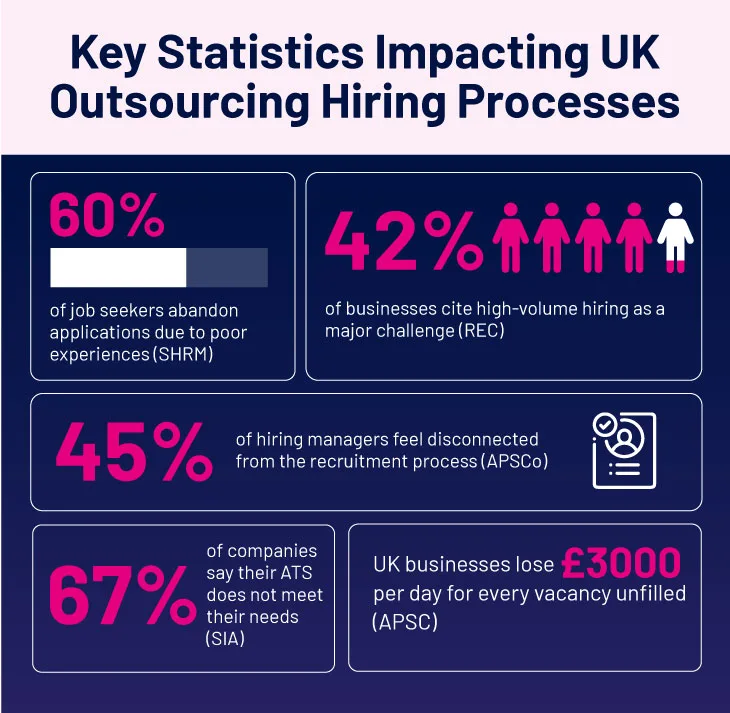Topics: Outsourcing Recruitment, UK Outsourcing and Offshoring Industry, UK Staffing Industry
Posted on September 25, 2024
Written By Abishek Balakumar

From high-volume recruitment pressures, to problems in integrating with ATMs, and to processes which are not streamlined, inefficiencies in recruitment keep stacking up to continue slowing down the talent acquisition cycle. All these recruitment pain points haptic both the candidate experience and the bottom line of businesses in terms of valuable time and resources.
A recent report by the Society for Human Resource Management (SHRM) noted that nearly 60% of HR professionals in the UK cited inefficient hiring processes as a major impediment to the successful attraction of top talent. Now, let’s take a close look at five critical hiring challenges in UK outsourcing and offshoring and learn some practical advice on how to make an improvement on your process.
As the company grows, so does its recruitment requirements. Scaling the recruitment function to meet that demand often becomes a logistical headache to contend with. Such logistics include managing large pools of candidates, balancing multiple interviews, and ensuring quality, all adding layers of complexity to an already burdensome process. For its part, REC believes 42% of businesses view high-volume recruitment as their biggest operational challenge to fulfill-a source of long time-to-hire and disengaged candidates.
Solution: Recruitment Process streamlining shall look at all aspects of the current workflows and audit each step to identify areas where more can be done on autopilot, automatically screening CVs, or scheduling interviews and so forth, which is finalised by transformation consulting. In doing so, recruitment teams can work more efficiently without having a candidate who gets lost in the shuffle.
Compared to most other recruitment activities, candidate experience is an understated one. Unfortunately, it means the bottom line organisation’s potential to attract the best talent is directly connected to the candidate experience. A SHRM report shows 60% of job seekers abandon their applications due to slow or poor communication from the hiring team, but on the other side 45% of hiring managers say they feel disconnected from the recruitment process, feeling a lack of information and inefficient systems.
Solution: Treat the recruitment process as a customer service-kind of business. The level of communication at each step should be clear and effective with timely delivery. Give the candidates feedback regularly and keep the hiring managers in the loop. That would empower your team with the right tools and trainings to bridge the gap between recruiters and decision-makers, achieving better engagement on both ends.

Slow hiring times can mean lost top talent and derail key projects. SIA reports that, on average, it takes 40 days to hire a staff member in the UK-not significantly different from the global averages. Each day a role remains vacant not only impacts the productivity of that team but also brings in additional costs. The more drawn-out the process, the greater chances candidates may have to lose out to faster-moving competitors.
Solution: Reducing time-to-hire doesn’t mean they do things too hastily. Rather, it can be done in a more efficient manner. Have an audit of the hiring cycle that’s currently being used and determine how the process could be accelerated in the bottlenecks-like slow screenings or long delays in scheduling interviews. Encourage collaborative decision-making between recruiters and managers on how to accelerate the hiring process without losing the quality.
Most UK companies get frustrated about their new systems: the SIA showed that 67% of users are dissatisfied with the ATS. In reality, it is simply poor change management and lack of support for the new system, which has kept most of the low adoption rates and continued reliance on manual processes.
Solution: Effective implementation of ATS is much more than just the installation of new software; it involves a structured approach to change management. For that, clear communication, proper training, and support for all employees will be provided. By focusing on these areas, you ensure that new technology is effectively adopted to help your team work even better in the long term.
A good CRM would potentially transform the recruitment process. However, a good part of UK firms, 45%, still encounter challenges with it, especially in executive and university hiring APSCo reports. The top challenge? CRS and ATS platforms have not been fully integrated, enabling data to go siloed and the workflows not very efficient.
Solution: Tighten up your CRM so that it is fully integrated into your ATS and other recruitment tools. They will give you a singular view of candidate data, smooth out communication and decision-making. In addition, invest in specialist consultants who can help you align technology to the specific needs of your hiring teams for better collaboration and efficiency across the board.
Inevitably, in the UK outsourcing and offshoring industry, recruitment challenges will be inescapable, but they are not something to stop your business by. Offshore recruiting services such as optimization strategy, technology integration, and human-centred approach through dealing with the pain point of recruitment can really enhance efficiency when delivering a better experience for candidates, recruiters, and hiring managers.

Originally published Sep 25, 2024 08:09:46, updated Jan 20 2025
Topics: Outsourcing Recruitment, UK Outsourcing and Offshoring Industry, UK Staffing Industry